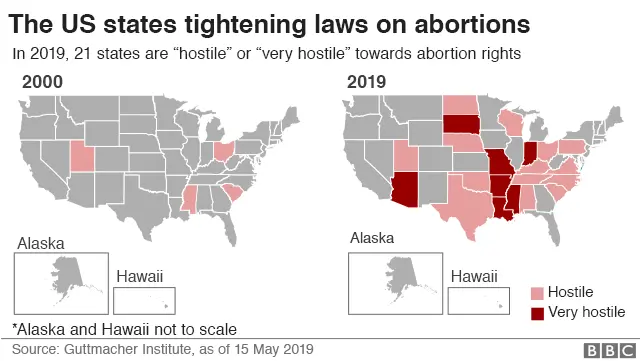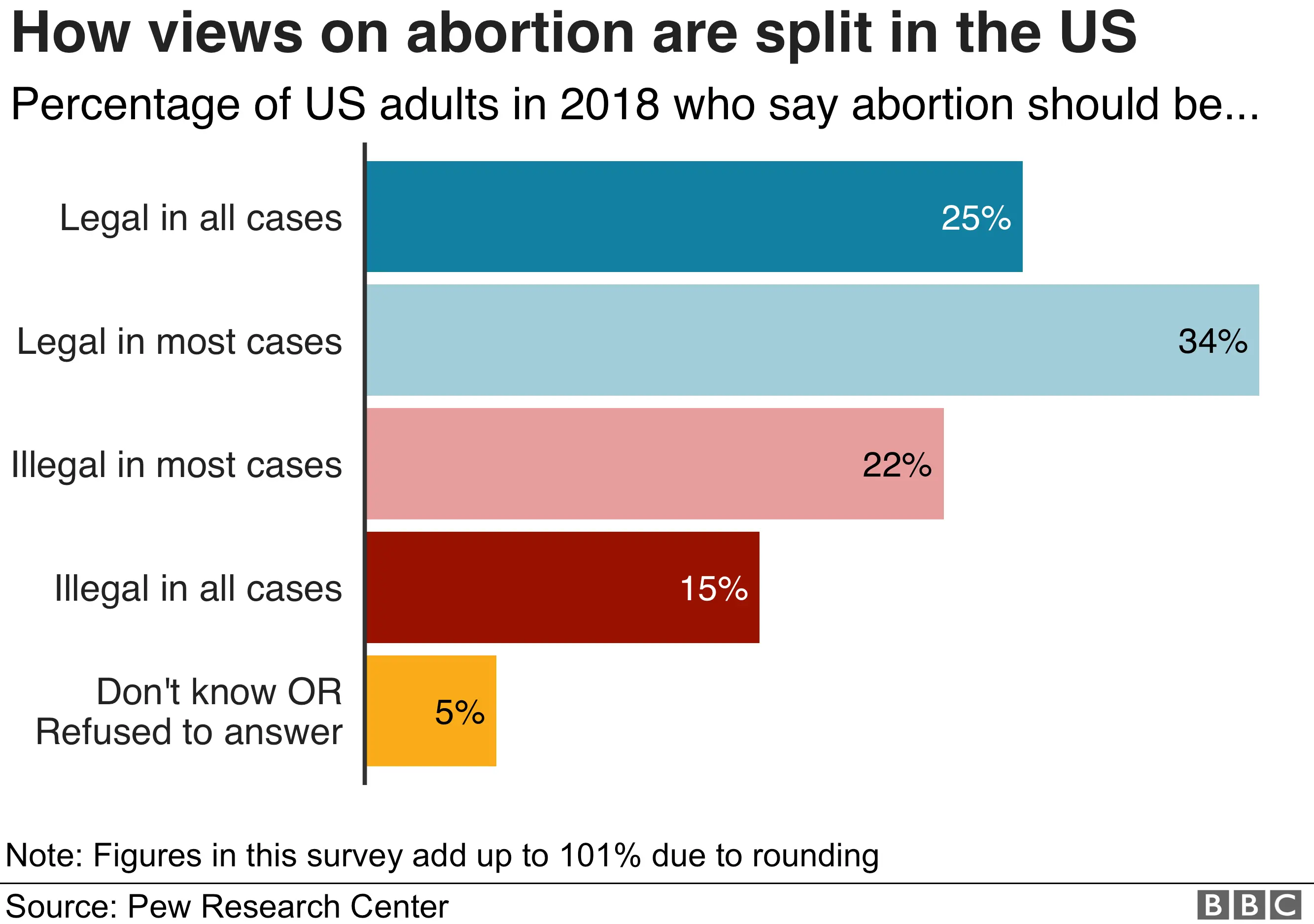Missouri latest state to move to restrict abortion laws
Missouri's state legislature has passed a controversial bill that would outlaw nearly all abortions at eight weeks of pregnancy.
The bill was approved by the Republican-led Senate on Thursday and the House of Representatives on Friday.
Republican Governor Mike Parson is now expected to sign the bill so it can become law.
If approved, abortions past eight weeks would be banned in most cases, including rape or incest.
Missouri state Senator Jill Schupp, a Democrat, condemned the bill for failing to "understanding that women's lives all hold different stories".
However, Republican state Senators Dave Schatz and Caleb Rowden published a joint statement praising the "life-affirming" legislation.
The votes come just days after Alabama's governor signed a near-total ban on abortion in the state, promoting protests and concern from pro-choice supporters.
Arkansas, Georgia, Kentucky and Ohio are among the other states to pass new abortion restrictions.
Most anti-abortion bills have faced legal challenges. However, this is what pro-life supporters hope will happen, as they want to reach the Supreme Court in order to challenge its landmark decision to legalise abortion in 1973.
Earlier this year the Supreme Court blocked implementation of new abortion restrictions in Louisiana. However, the ruling was made by a narrow margin and the case is due to be reviewed later this year.
Allow X content?

Why is this happening now?
The Missouri bill comes amid a nationwide push for new restrictions by opponents of abortions.
They have been emboldened by the addition of two conservative justices nominated by President Donald Trump, Neil Gorsuch and Brett Kavanaugh, who give the nine-member court a conservative majority.
Their aim, they say, is for the landmark 1973 Roe v Wade ruling to be undermined or overturned completely.

What is the Missouri bill?
The bill, dubbed Missouri Stands With The Unborn, would outlaw performing an abortion in nearly all cases.
Under the bill, exemptions would be made for medical emergencies, but not pregnancies caused by rape or incest.
Doctors who perform abortions more than eight weeks into pregnancy would face five to 15 years in prison, the Associated Press reports.
A woman who has an abortion would not be held criminally liable.
Mr Parson, who supports the bill, said it would allow Missouri to become "one of the strongest pro-life states in the country".


Ever since the US Supreme Court handed down Roe v Wade in 1973, anti-abortion activists have understood that until the ideological composition of the nine-member body changed, the progress they could make in restricting abortions would be at the margins. Now, they hope, their decades of effort to reshape the high court are approaching fruition.
That could have a profound impact on US politics heading into the 2020 elections. If the future of Roe is in doubt, the abortion debate could change from a legal to a political one. Instead of pondering the selection of judicial nominees - a sometimes abstract concept - candidates for public office will be pressed for their views on outright prohibition.
It may be an uncomfortable conversation for some conservatives, who already have shied away from endorsing an Alabama abortion ban that is seen by a majority of Americans as too extreme.
Many Democrats, on the other hand, are still struggling to explain when and where they may back some further restrictions.
Until now, the abortion issue has done more to motivate and engage evangelical voters than it has those on the left. If the right to abortion is at risk, that dynamic may change.

What restrictions are other states enacting?
Earlier this year the governors of four states - Georgia, Kentucky, Mississippi and Ohio - signed bills banning abortion if an embryonic heartbeat can be detected.
Opponents say this amounts to a ban on abortion because cardiac activity in an embryo can be detected as early as the sixth week, before a woman may be aware that she is pregnant.
The Guttmacher Institute, which campaigns for reproductive rights, says none of these bans are yet in effect, but their introduction is part of the same strategy to get the cases heard by the Supreme Court, it says.
Overall 28 states are currently considering legislation that would ban abortion in a variety of ways, it says.


Are you in Missouri? How are you affected by the issues in this story? [email protected]
Please include a contact number if you are willing to speak to a BBC journalist. You can also contact us in the following ways:
- WhatsApp: +44 7555 173285
- Tweet: @BBC_HaveYourSay
- Text an SMS or MMS to +44 7624 800 100
- Please read our terms of use and privacy policy
